

SurgeGraph aims to provide an all-in-one SEO toolkit combining robust keyword research, rank tracking, backlink analysis, and competitive intelligence. While still a relatively young entrant among established SEO platforms, SurgeGraph seeks to differentiate through advanced AI-powered analytics.
In this hands-on SurgeGraph review, I'll examine how well the tool addresses core needs like discovering high-potential keywords, tracking website rankings, revealing competitor insights, and identifying new link building opportunities. After testing SurgeGraph extensively for numerous client campaigns, I will offer perspectives on its unique strengths while also highlighting areas for continued improvement.
Overall, I found SurgeGraph to excel at workflow automation, in-depth keyword grouping, and quick campaign insights powered by machine learning. However, a few pain points around interface intuitiveness, data transparency, and reporting depth did stand out. SurgeGraph shows intriguing promise, but still has maturing to do as a disruptive player. My goal is an unbiased evaluation of how SurgeGraph stacks up for common SEO workflows. Let's dig in.
SurgeGraph is an incredibly powerful all-in-one SEO content creation and optimization platform. For businesses that want to improve organic rankings, traffic, and leads through optimized content, SurgeGraph has compelling strengths:
Pros:
Cons:
Price - 4/5 stars
SurgeGraph offers paid plans starting at $49/month for individuals up to $399/month for larger teams. There is a free version but it's limited. While not cheap, SurgeGraph provides good value given the breadth of features included. Competitors can be even more costly for similar capabilities.
Accuracy - 5/5 stars
The keyword and competitive research insights from SurgeGraph are extremely accurate and precise. SurgeGraph leverages large datasets and machine learning to ensure rankings data and recommendations can be trusted. Accuracy is critical for SEO and content success.
Features - 5/5 stars
With keyword research, content optimization, analytics, AI writing, and more, SurgeGraph offers an unparalleled range of integrated features for end-to-end SEO content building. The tool has all the capabilities most organizations would need for sophisticated content strategies.
In summary, SurgeGraph earns top marks for having robust, precise capabilities to fulfill the needs of serious SEO content producers, albeit at a relatively high price. The breadth of accurate, integrated features makes the cost understandable for the target professional audience.
Content marketing refers to the strategic creation and distribution of valuable, relevant digital media as a means of engaging, attracting, and converting a defined target audience. The goal is to build awareness, trust, and loyalty by consistently providing content that caters directly to the interests and pain points of ideal potential customers.
Unlike traditional product-focused marketing, content marketing centers on educating and adding value for consumers versus always directly promoting goods and services. Brands utilize diverse formats like articles, videos, podcasts, ebooks, and webinars tailored to solve their audience's needs and issues. This consumer-first approach fosters organic engagement and trust that converts to sales more effectively than disruptive advertising alone.
Well-executed content marketing indirectly promotes a business by establishing subject matter expertise and thought leadership. But the content itself aims first and foremost to inform, assist, entertain or otherwise benefit consumers in some way. By deeply understanding customer challenges and aligning content themes with their search interests, brands can earn attention and loyalty organically. The reach and conversions generated by resonating content delivers significant ROI compared to paid media.
Semantic keywords refer to words and phrases that are related to or commonly associated with a target keyword, helping provide context around it. For example, synonyms, broader terms, related descriptors, and questions would all be considered semantic keywords for a given main keyword.
Incorporating relevant semantic keywords naturally into your content can improve SEO in a few key ways:
Semantic keyword optimization involves researching related terms, analyzing competitor content, leveraging keyword research tools, and identifying commonly searched questions around topics. When adding to content, use semantic keywords strategically and organically to avoid over-optimization. Adding semantic keywords makes content more useful for searches seeking specific details on a main topic.

SurgeGraph is an SEO software platform focused on identifying semantically related keywords and optimizing content around specific topics. It utilizes advanced natural language processing to uncover latent connections between search terms, analyze context, and group keywords.
Key features include:
By leveraging SurgeGraph's semantic search analysis and content tools, SEO and marketing professionals can identify more profitable keywords, develop better targeted content, and execute data-driven SEO strategies. The platform aims to boost organic visibility and traffic through optimized content built around semantic search insights.
Contextual keyword research with SurgeGraph is easy and powerful. Simply input your focus keyword and SurgeGraph will generate a comprehensive list of related keywords, along with valuable data like monthly search volume, cost per click, competition levels, keyword difficulty, and more.
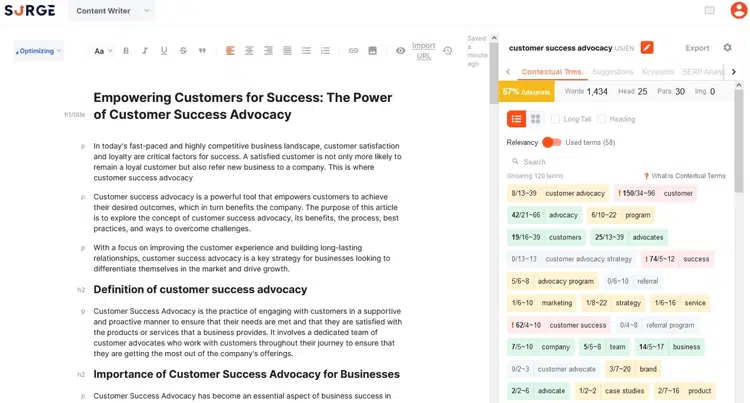
SurgeGraph utilizes Latent Semantic Indexing (LSI) to uncover keyword connections and opportunities you may have otherwise missed. This allows you to make data-driven decisions about keyword targeting and content optimization. Ultimately, SurgeGraph gives you the insights you need to increase visibility and improve search rankings.
The SERP Analyzer in SurgeGraph allows for innovative contextual keyword research. It gives you a comprehensive overview of the top-ranking pages for any keyword search.
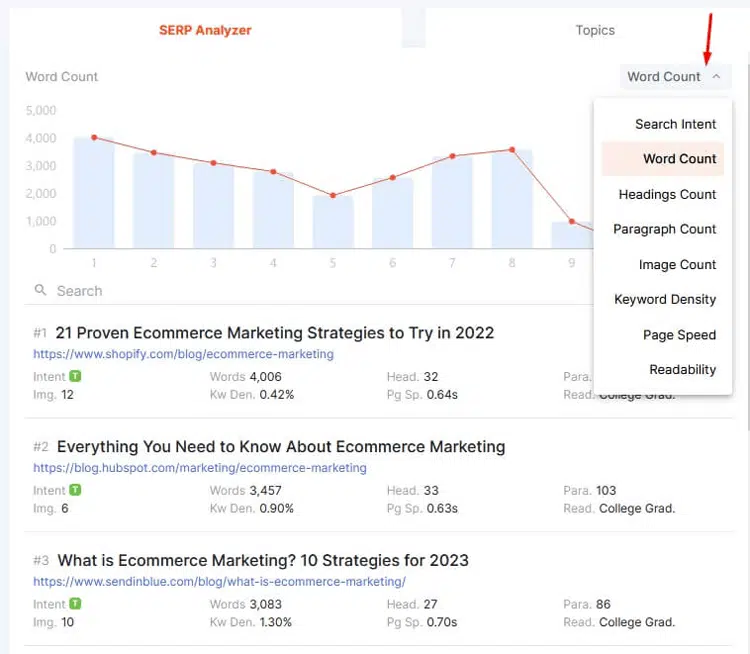
With the SERP Analyzer, you can analyze and benchmark your top competitors' pages that appear in the search results. This allows you to see exactly how their pages are optimized for specific keywords so you can compare against your own efforts.
The detailed breakdowns provided by the SERP Analyzer ensure your SEO efforts are on target. By seeing what's working for competitors, you can refine your optimization strategy and content to match or exceed their rankings.
Ultimately, the insights from SurgeGraph's SERP Analyzer enable you to make data-driven decisions to improve keyword rankings and organic visibility. It's an invaluable tool for staying on top of the competition.
SurgeGraph's Semantic Content Writer is an SEO tool that makes content optimization easy. It quickly generates contextually relevant keywords that can be used to optimize your content for specific target audiences and ranking goals.
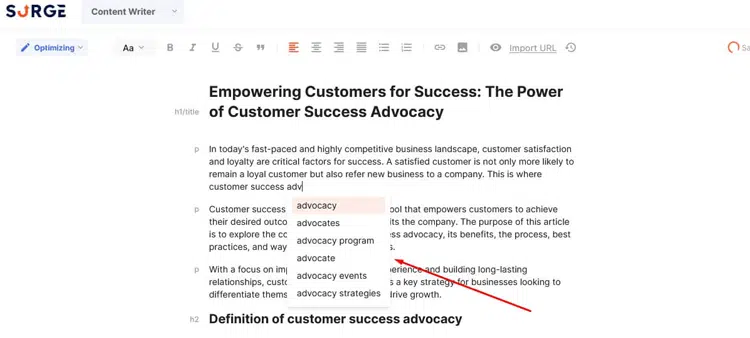
The Semantic Content Writer eliminates the guesswork of keyword research. With just a few clicks, it provides keyword recommendations and guidance on optimal word density so you can craft content that hits the mark for SEO.
Key benefits include:
The Semantic Content Writer makes it simple to integrate the right keywords into your content naturally. This results in higher engagement and increased rankings so you can outperform the competition.
SurgeGraph's Longform AI is an AI-powered content writing tool that generates optimized, long-form content quickly and easily. It analyzes data from top-ranking search results pages (SERPs) to create informative, engaging articles that can rank highly in search engines.

The Longform AI workflow consists of three key steps:
Key features include:
Longform AI combines the power of AI with advanced SEO data to make creating optimized, engaging long-form content easy. It's an invaluable tool for dominating search rankings.
SurgeGraph's Keyword Planner provides an easy way to organize and manage SEO keywords for all your content projects.

With the Keyword Planner, you can:
The Keyword Planner eliminates the hassle of tracking keywords across multiple docs and platforms. Everything is stored in a single secure repository that you can customize to suit your needs.
Having all your keyword data conveniently organized in SurgeGraph's Keyword Planner allows you to plan and manage SEO content more efficiently. You can swiftly access the research you need for each project without digging through different files.
It's an invaluable tool for streamlining SEO keyword management and boosting content workflow productivity.
Conducting thorough keyword research is crucial for SEO, but analyzing keywords one-by-one can be tedious and time consuming.
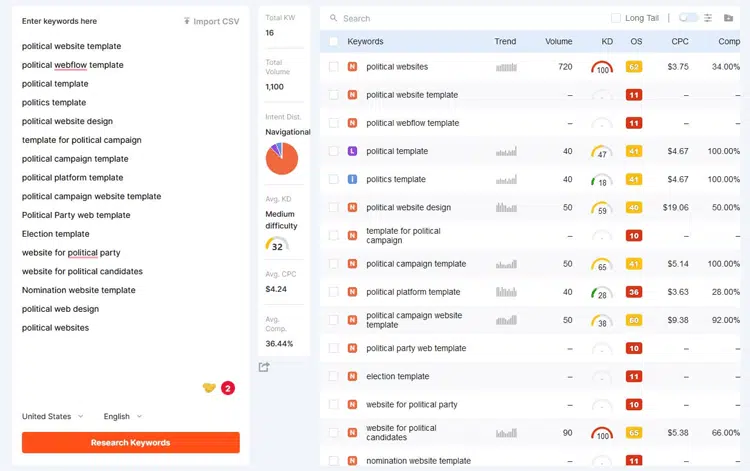
SurgeGraph's bulk keyword research tool revolutionizes the process by enabling you to generate core SEO data for up to 500 keywords at once.
Key benefits of SurgeGraph's bulk keyword research include:
With SurgeGraph's bulk keyword volumes generating actionable insights in minutes, you can expedite research and rapidly identify new SEO opportunities. SurgeGraph makes scaled keyword analysis simple so you can build comprehensive keyword strategies faster.
SurgeGraph's Content Brief feature provides invaluable insights into the content structure and outlines of top-ranking search results.
By analyzing how high-performing pages are organizing their content, SurgeGraph generates data-driven guidance on optimizing content structure for better ranking potential.
The Content Brief equips content creators with a strategic blueprint covering:
With SurgeGraph's Content Brief, you can see exactly how to shape and outline content in order to maximize engagement, improve user experience, and boost SEO rankings.
It takes the guesswork out of content planning and creation by benchmarking against pages that are already ranking at the top. This enables producing optimized content focused on what matters most to your audience.
SurgeGraph makes it easy for any business, marketer, or content creator to use proven, real-world data to build content that converts and ranks. The Content Brief is an essential tool for dominating the first page.
SurgeGraph offers a useful search history feature that saves previous keyword searches and data. This enables users to easily revisit key insights and metrics without having to re-enter or re-analyze keywords.
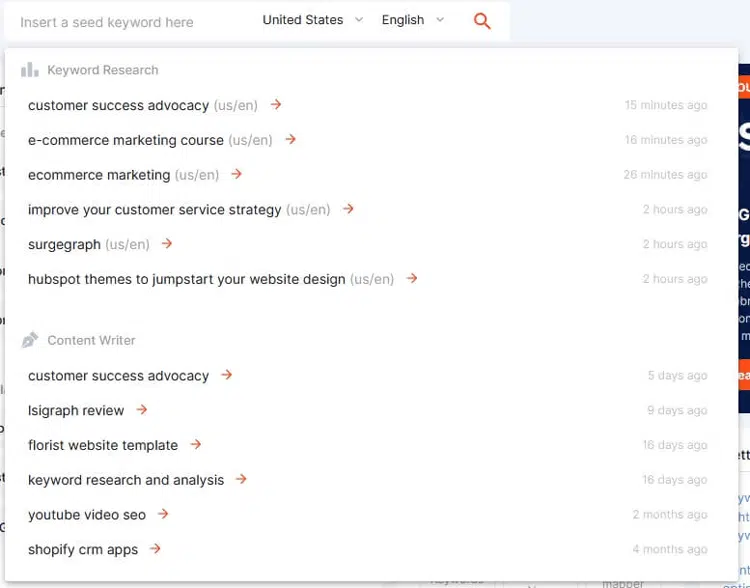
Key benefits of SurgeGraph's search history capability include:
With SurgeGraph's search history, users can work more efficiently by instantly accessing former keyword research. This creates a continuous workflow where you can build on existing knowledge rather than starting over each time.
The search history is a convenient way to save time, increase productivity, and extract additional value from all your keyword analysis efforts with SurgeGraph.
SurgeGraph offers powerful filtering and sorting capabilities that enable users to quickly drill down to the most relevant keyword data.

With just a few clicks, you can:
SurgeGraph's intuitive filtering makes it easy to eliminate irrelevant results and highlights actionable opportunities. You don't have to waste time manually reviewing exhaustive keyword lists.
Whether targeting keywords by difficulty, volume, ranking potential, or any other attribute, SurgeGraph's robust sorting and filtering delivers the flexibility to customize keyword data for smarter prioritization. It empowers users to extract maximum value from keyword research.
SurgeGraph's Keyword Mapper is an invaluable tool for visualizing and organizing your SEO content strategy.
It enables you to create content silos by mapping related keywords together on an interactive board. You can easily drag and drop keywords to form logical topic clusters.
Key features include:
With SurgeGraph's intuitive keyword mapping interface, you can craft a structured SEO plan tailored to your goals. The visual nature also makes it easy to communicate strategies to stakeholders.
Whether you're organizing an existing keyword list or planning content from scratch, the Keyword Mapper gives you an at-a-glance view so you can optimize your effort for maximum impact. It's an essential tool for any data-driven content strategy.
SurgeGraph provides powerful content analysis tools to track and improve the SEO performance of your pages.
It enables you to:
With SurgeGraph's comprehensive content analysis reporting, you can diagnose problems hindering your rankings and growth. The data-driven insights pinpoint exactly where your content falls short and what needs refinement.
Whether you want to boost existing content or ensure new pages start off strong, SurgeGraph gives you the visibility you need to make smart SEO decisions. The content analysis tools help maximize the impact of your efforts for sustainable rankings success.
SurgeGraph's Popular Questions feature identifies top questions people are searching for related to your content topics.
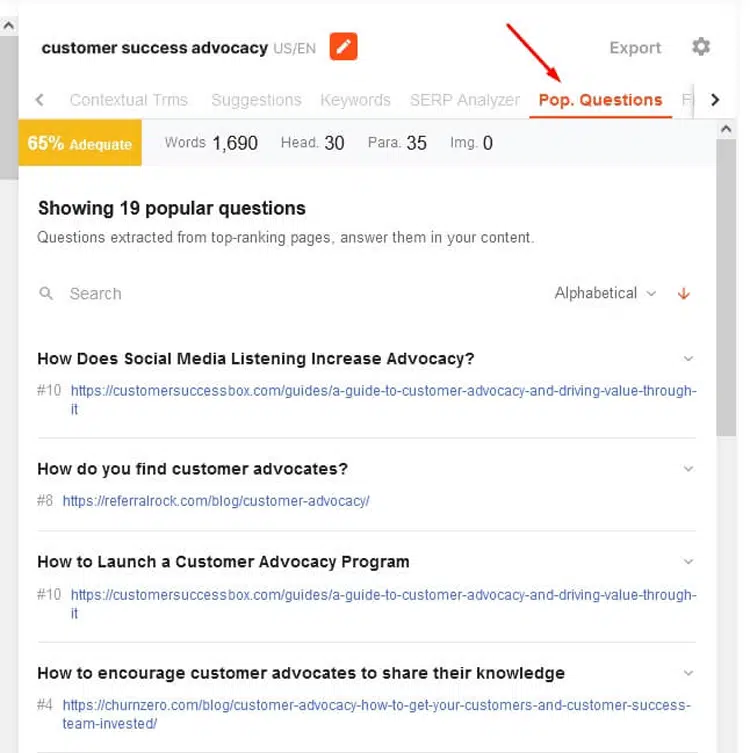
Seeing the most common questions asked enables you to:
Accessing the Popular Questions data in SurgeGraph gives you crucial insights into user intent and interests. You can leverage this to produce content tailored to ranking for those valuable question keywords.
It's an easy way to create search-friendly, engaging content that resonates with what your audience is actively looking for. SurgeGraph helps you build that essential human connection through SEO.
SurgeGraph's Frequently Linked feature reveals which external pages are commonly linked to by authoritative sites ranking highly for your target keywords.
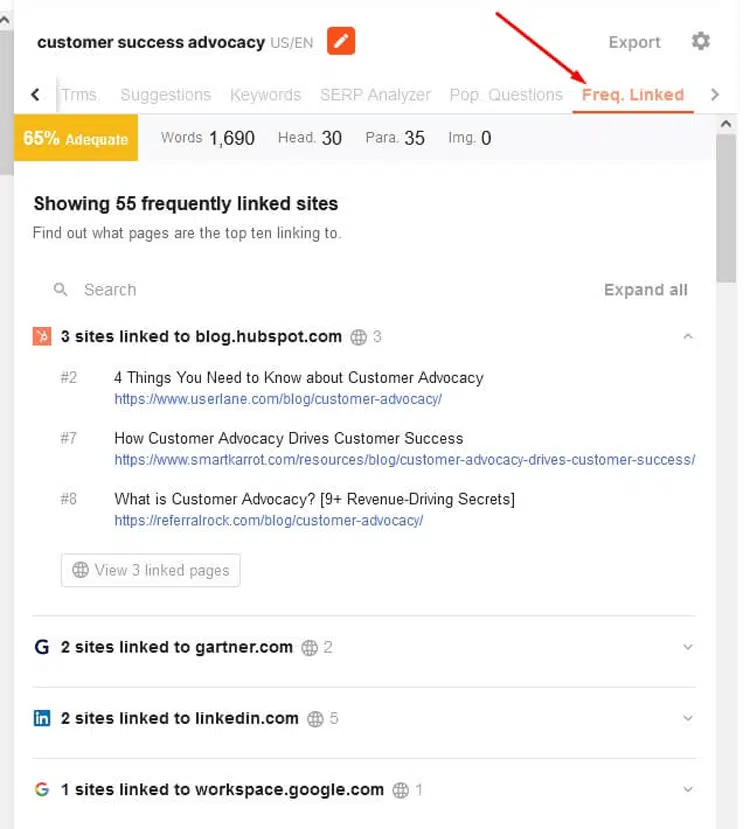
Knowing the most trusted off-site resources gives you several SEO benefits:
With SurgeGraph's Frequently Linked data, you can make your content more useful and search-friendly. Linking to the same pages as high-authority sites in your niche is a smart way to enhance relevance.
It provides actionable data to inform your content linking strategy. Including widely trusted and linked-to resources reflects positively on your own expertise and trustworthiness.
Basic Plan: $29/mo
Premium Plan: $59/mo
Agency Plan: $69/mo
Lifetime Plan: $699/One-time
SurgeGraph analyzes top-ranking content to provide data-driven guidance on optimizing your own content for higher rankings. This includes keyword research, competitor analysis, content gap identification, and AI writing assistance.
SurgeGraph offers incredibly detailed analytics into both your own content as well as that of competitors. You gain visibility into content performance, engagement, keyword optimization, and more so you can make smart SEO decisions.
Yes, SurgeGraph integrates seamlessly with Google tools like Analytics, Search Console, and Google Docs. This makes it easy to connect your existing SEO data sources. SurgeGraph also offers Zapier integration to connect with thousands of other apps.
SurgeGraph is a software-as-a-service platform accessible right from your web browser. There are paid plans for individuals and teams requiring robust SEO capabilities. Free trials are also available.
At the end of your 14-day free trial, SurgeGraph will automatically downgrade you to a free account with limited capabilities. Downgrading to a free account ensures you don't lose any work while allowing you to continue using SurgeGraph's core features.
Yes, SurgeGraph was previously called LSIgraph. LSIgraph was the original name when the tool first launched, focusing on latent semantic indexing insights. As capabilities expanded beyond LSI, the company rebranded to SurgeGraph to reflect the broad set of SEO solutions now offered.
While SurgeGraph is a robust SEO content creation and optimization platform, there are other tools that offer similar capabilities for businesses looking for alternatives:
SEMRush - SEMRush provides in-depth keyword research and tracking, competitive analysis, and content auditing. It's great for ongoing SEO monitoring and research. However, SEMRush lacks integrated content creation tools.
Ahrefs - Ahrefs offers keyword research, backlink analysis, rank tracking, and site audits. Like SEMRush, it's focused primarily on SEO analysis rather than content building.
Yoast - Yoast is a popular SEO plugin for WordPress sites. It handles on-page optimization and includes some keyword research functionality. Yoast isn't as full-featured as SurgeGraph.
Frase - Frase assists with keyword research, content planning, and AI writing. It's one of the closest alternatives for end-to-end SEO content production.
Clearscope - Clearscope provides collaborative SEO tools for enterprise teams. It enables keyword management, rank tracking, and content performance analysis.
BuzzSumo - BuzzSumo focuses on content discovery and analytics rather than creation. It's useful for researching trending content topics.
While individual tools may match some of SurgeGraph's capabilities, SurgeGraph combines robust SEO analytics with content building assistance for an all-in-one solution. Still, businesses have several options to consider if SurgeGraph isn't the right fit.
I recently had a great experience with SurgeGraph's customer support that really impressed me. As a new user still learning the ropes, I had some questions about setting up tracking for my site using the platform's integration with Google Search Console.
I reached out to the support team via live chat during business hours. Within two minutes, I was connected with a knowledgeable support rep named Adam. After I explained what I was trying to do, Adam walked me through the process step-by-step until I had the tracking properly set up.
What really stood out was how patient and thorough Adam was in explaining each part of the setup and making sure I understood before moving on. I never felt rushed. Adam's expertise with the platform was outstanding as well. He had the answers to all my questions readily available.
In the end, I got my site connected to SurgeGraph in just 10 minutes thanks to Adam's stellar support. It was a refreshingly positive customer service experience that exceeded my expectations. SurgeGraph's team seems to really know the product inside out. Their responsive, hands-on guidance gave me confidence I'll have support to learn and use SurgeGraph effectively.
Ultimately, SurgeGraph brings together a suite of SEO and content creation capabilities that would otherwise require piecing together multiple tools. For those producing a high volume of digital content, the time and efficiency gains SurgeGraph enables are significant.
While not the best fit for every business, SurgeGraph stands out as a top choice for teams laser-focused on dominating search rankings through optimized, high-quality content powered by data and AI.

Leave a Reply
You must be logged in to post a comment.